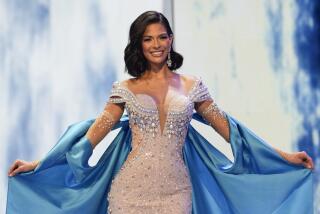Censorship Attempt Fails in Nicaragua
- Share via
MANAGUA, Nicaragua — The footage begins like a campaign ad for former President Daniel Ortega, who is running for office again. The onetime revolutionary commander solemnly quotes the Bible: “By their works ye shall know them.”
But the ad suddenly becomes something else, with the focus switching to images from the Ortega years, the 1980s: a rapid-fire series of stark black-and-white photographs of rationing lines, bodies of soldiers killed by Contras battling the Ortega government, and a uniformed Ortega greeting Cuban President Fidel Castro.
The one-minute anti-Ortega spot contrasts sharply with the feel-good videos of scrubbed young people waving flags to pop music that are the staple of most other political advertising during the 1996 presidential campaign, now in its final week. And less than 24 hours after the anti-Ortega ad first appeared, the Supreme Electoral Council ordered it--and three others like it--off the air.
“We have noted with concern that some videos do not comply with the electoral ethics rules of creating a climate of harmony, nor do they encourage civic values in the Nicaraguan people,” wrote council Secretary Cyril Omeir Green in a letter to television station managers.
The decision caused an immediate uproar in Nicaragua, a country that over the last six years of democracy has prided itself on throwing off a long tradition of press censorship. Under that pressure--and with the return of council members who were away when the emergency meeting to ban the spots was called--the council has quietly reversed itself, telling station managers privately that they may broadcast the spots.
“It [the ban] was a mistake, and everyone has recognized this,” said Alfonso Callejos, a council member who was absent during the vote to censor and said an official retraction is unnecessary.
However, the council should publicly acknowledge the error, insisted Blanca Buitrago, president of the Confiscation Victims Assn., which sponsored the spots. And the council should step back from the position that it has the right to censor, she said. “Why don’t they accept responsibility for creating a situation that was shocking and illegal?” she asked.
The association, which claims to represent 3,000 Nicaraguans and foreigners whose land was confiscated by Ortega’s Sandinistas, protested this week to the Inter-American Press Assn. during a meeting in Los Angeles. The association spent about $5,000 to produce a dozen television and radio spots.
*
Many political analysts downplay the brush with censorship as a simple case of excessive enthusiasm. “They were just trying to keep the level of confrontation as low as possible,” said Adolfo Calero, a former Contra leader who himself has spoken out strongly against the Sandinistas in general and against confiscation in particular.
But Buitrago considers the situation far more serious, because the right to freedom of expression is still fragile in a country that suffered censorship under the Sandinistas and the dictatorship of Anastasio Somoza Debayle that they overthrew. “They were trying to keep us from telling the history of Nicaragua, the way the Sandinistas kept people from finding out as it was happening,” she said.
More to Read
Sign up for Essential California
The most important California stories and recommendations in your inbox every morning.
You may occasionally receive promotional content from the Los Angeles Times.









